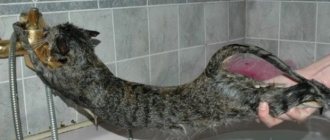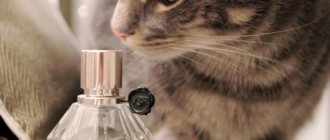The cat's sense of smell is 14 times better than that of humans, so it is much more developed and allows them to perceive odors with greater intensity. This advantage is very useful for discovering scents that you easily adore, as well as quickly identifying those that you hate.
If you're one of those people who keeps your home smelling great or routinely uses essential oils for natural therapy, you'll want to use these scents without disturbing your furry companion. In this HowMeow article, we share 10 scents that attract cats . However, we already expect that not all odors produce the same effect in all cats. Some may have the opposite effect, and we'll also explain why.
catnip
Nepeta cataria, better known as catnip, it produces a powerful narcotic effect . In the animal, the active ingredient found in the plant, nepetalactone, has a psychoactive effect on cats, which encourages them to stimulate the mind and stimulate play. Thus, when a cat smells catnip, it tends to rub it, lick it, eat it, exhibit unusual behavior (such as jumping), and even hunt non-existent animals.
Because it stimulates the animal's mind and keeps them active, catnip is one of the most beneficial herbs for them. However, while it may be the smell that attracts cats, for the most part it is not the same for all cats. Some people do not react to the plant in the same way. This is because the catnip reaction is genetic and some simply don't have the DNA to appreciate it...[one]. More information in our article on “properties of catnip”.
olive
Considered to be another scent that cats enjoy, olive tree also has a narcotic effect that alters the cat's behavior. This is because one of the most active components in the leaves and trunk of the olive tree is a substance called oleuropein . Like catnip, when a cat senses it, it tends to rub, lick, eat its leaves and exhibit a more active attitude, similar to the action they have during mating behavior...
Some cats have this attraction to leaves, while others are attracted to all parts of the olive tree. This includes olives and products such as olive oil. Likewise, this scent has not yet been scientifically proven to have a relaxing effect in cats, so make this statement with caution, but it certainly affects their central nervous system and makes them more active and playful.
To have or not to have bleach in the house
What advice can you give to the owner of such animals? In fact, the animal must be protected from all liquids containing chlorine. This means that all containers with old household chemicals should go into the trash. There are quite a lot of household chemicals without this harmful substance. If your cat likes the smell of bleach, you should not give it access to this substance.
Cats, when they get into a new home, adjust it to suit themselves. They mark all comfortable corners and furniture with their scent. Only after this will the new place truly become home. The smell of bleach disrupts this idyll. For the animal, this is stress, which is involuntarily provoked by the owner.
Therefore, most owners prefer not to follow their pet’s lead, but actively fight the bad habit.
First of all, your pet can be accustomed to new, less dangerous smells, for example, catnip. This plant can be grown in a pot on a windowsill.
In a pet store you can buy a special toy stuffed with this grass. Most animals like this smell no less than the smell of bleach.
Honeysuckle
Honeysuckle is part of the popular Bach flowers, and as such they act on a cat's body to have a powerful calming and calming effect. Thus, we can say that the aroma of this plant is one of the aromas that relax cats . So much so that these plants are now used in cats and other animals for therapeutic purposes such as treating insomnia, stress or anxiety...
Like the previous plants, honeysuckle's composition attracts cats and makes them want to rub, lick and eat the floor. But be careful! Honeysuckle Berries They are toxic to cats so it is important to keep them away and not let them eat this plant, just smell it and enjoy its aroma.
How to break your pet's habit
When an owner is annoyed by such excessive attention from his cat, there are several ways to try to get rid of this habit:
- A game. By switching attention to entertainment and giving your pet an outlet for energy, you can relieve her for a while from the desire to lick something or someone.
- Weasel. If the problem is stress or lack of attention, you need to pet and hug the animal more often, and the problem will disappear soon.
- Change of interests. Apply a special solution – catnip – to your pet’s toys. It is sold in pet stores. Its scent will attract the cat's attention.
- Refusal. If your pet's behavior becomes overly intrusive, every time he tries to lick him, you need to gently but decisively push him away and make it clear that this is not worth doing. After some time, the method will work and the cat will stop trying.
- Substitution for another item. Buy a fur mitten and put it on your hand every time you try to lick your fingers. After time, attention will switch to the object, and the owner will no longer be needed.
It is worth remembering that such behavior of a pet can be due to a whole range of different reasons and there is no need to get angry or scold him for it. After all, with such behavior the cat does not want to cause harm, but is simply trying to attract the owner’s attention to his person or show love.
Why do cats lick their armpits?
lavender
Just like us humans, the aroma emitted lavender attracts cats, drawing them towards it to smell and rub them. However, its attraction power is not as strong as the previous plant, and some cats may not show the same interest. However, for many, it is the smell that cats hate. The reasons are poorly understood. It's possible that the reasons are genetically similar to catnip or that it's just a personal preference on behalf of the cat.
If your furry companion is one of those cats that loves this scent, you can use it to encourage a state of relaxation . Using this natural therapy, especially in cases of anxiety and mild aggression, along with other relaxing factors and finding the cause of the problem, has been shown to help the animal feel much calmer.
Cats don't like essential oils . Because your sense of smell is so strong, any essential oil can be too overpowering. Don't be too strong on scents that are supposed to be relaxing scents for cats. If used in a diffuser or highly diluted, it can mimic the pleasant aroma of fresh lavender.
Lavender and cats This comes with a caveat, however. Eating the plant is toxic to cats. It is important that the cat cannot swallow flowers or leaves.
Official website of Vladimir Sakhnenko|Belief in the best
's sense of smell is 14 times better than a human's, so it is much more developed and allows them to perceive odors more intensely. This advantage is very useful for detecting odors that attract them easily, but also quickly identifying those that they hate.
If you're one of those people who keeps their home well-scented or routinely uses essential oils for natural treatments, you'll want to use these scents without disturbing your furry animal. In this article, we share 10 smells that attract cats . However, we already assume that not all odors produce the same effect in all cats. Some of them may have the opposite effect, and we will also explain why.
Cat mint
Nepeta Cataria, better known as catnip, has a powerful narcotic effect on the animal. The active ingredient contained in the plant, nepetalactone, has a psychoactive effect on cats, which leads to stimulation of their mind and will stimulate play. Thus, when a cat smells the scent given off by catnip, they tend to rub against it, lick it, eat it, exhibit unusual behavior (such as jumping), and even hunt non-existent animals.
Because catnip stimulates animals' minds and keeps them active, it is one of the healthiest herbs for them. However, although this is perhaps the smell that attracts cats the most, it is not the same for all cats. Some individuals react to the plant differently. This is because the catnip reaction is genetic and some simply don't have the DNA to appreciate it
Olive
Considered as another of the smells that cats enjoy, olive tree also produces a narcotic effect that changes the cat's behavior. This is because one of the most active components in the leaves and trunk of the olive tree is a substance called oleuropein . As with catnip, when a cat smells this scent, it tends to rub, lick, eat its leaves, and exhibit a more active attitude, an action similar to what it exhibits during mating behavior.
Some cats only have this attraction to the leaves, while others are attracted to all parts of the olive tree. This includes the olives themselves and products such as olive oil. Also, this scent has not yet been scientifically proven to have a relaxing effect on cats, so make this claim with caution, but it certainly affects their central nervous system and makes them more active and playful.
Honeysuckle
Honeysuckle is one of the popular Bach flowers and as such they have a powerful calming effect on the cat's body. Thus, we can say that the scent emitted by this plant is one of the scents that relaxes cats . So much so that such plants are now used in cats and other animals for therapeutic purposes such as combating insomnia, stress or anxiety.
As with the previous plants, the composition of honeysuckle attracts cats and makes them want to rub on the floor, lick it and eat it. But be careful! Honeysuckle berries are poisonous to cats , so it is very important to keep them away and not let them eat this plant, just smell it and enjoy its aroma.
Lavender
Just like us humans, the scent of lavender attracts cats, drawing them in to sniff and rub against it. However, its attraction power is not as strong as the previous plant, and it is possible that some cats will not show the same interest. However, for many, it is a smell that cats hate. The reasons for this are little known. It is possible that the reasons are genetically similar to catnip or it is simply a personal preference on the part of the cat.
If your furry companion is one of those cats that loves this scent, you can use it to induce a state of relaxation . Especially in cases of anxiety and mild aggression, using this natural therapy, along with other relaxing factors and discovering the cause of the problem, has been shown to help the animal feel much calmer.
Cats don't like essential oils . Because their Sense of Smell is so strong, any essential oil can be too overpowering. Don't be too harsh with scents that are supposed to calm cats. If used in a diffuser or highly diluted, it can mimic the pleasant aroma of fresh lavender.
However, “lavender and cats” comes with a caveat. Eating this plant is toxic to cats. It is very important that the cat cannot swallow flowers or leaves.
Thyme
Thyme is not only part of the smells that attract cats, but it is also one of the healthiest for them. Due to its soothing and anti-inflammatory properties, when made as an infusion or tea, it helps treat irritated and inflamed eyes in cats. This means it can help relieve symptoms caused by conjunctivitis, for example, or a specific allergy.
On the other hand, its aroma acts as a natural relaxant and therefore helps keep the cat calm. To do this, ideally you should use thyme essential oil or purchase this aromatic plant. However, as with lavender, thyme may not be as effective because not all cats are attracted to its scent.
Mint, basil and peppermint
The next three places are taken by mint, basil and peppermint, which belong to the same family as catnip ( Lamiaceae ). That's why it's no surprise that the scent of these plants, which are so often used for cooking, is also one of the smells that cats love. Thus, cats that are attracted to them exhibit the same symptoms described in the section on catnip, activation and mental stimulation. Again, these are also pretty strong odors, so overpowering them with them would be counterproductive.
Floral scents
Many cats feel trapped by the intense scent of certain flowers, such as roses, daisies and lilies. But if this applies to your cat, you should know that some of them are very toxic if they ingest them, such as the last two mentioned. Thus, it is best to keep cats away from the plant itself to avoid possible intoxication.
Fruit aromas
Fruits such as strawberries, peach or watermelon produce very distinctive and intense aromas that quickly attract cats' attention. In this sense , certain smells can certainly attract cats and encourage them to try food. Many of them even have many benefits for your body, such as antioxidant, cleansing and diuretic properties, as well as fiber and many vitamins. However, not all fruits are attractive to these animals, since citrus fruits emit a truly unpleasant odor for them.
Can cats smell poisonous plants?
When it comes to how cats feel, it's important to be clear. The reason is that many people don't realize that just because a cat likes a smell doesn't mean they will eat it. For example, lavender is a scent that attracts some cats, but ingestion is toxic and can lead to poisoning . Just like our fruity-scented shampoo can smell great but we don't take a sip, cats can enjoy scents without eating the source.
However, unlike humans, cats are not always picky about what they eat. So we have to make sure that they don't ingest anything harmful. Use a reflector to dispel the scent or avoid using scents that can be easily smelled by the cat. If your cat ingests something toxic, pay attention to any adverse symptoms and contact your veterinarian if there is a possibility of poisoning.
Source: https://www.animalwised.com/10-smells-that-attract-cats-2434.html
Thyme
Thyme is not only part of the smells that attract cats, but it is also one of the healthiest for them. Its soothing and anti-inflammatory properties, when made as an infusion or tea, help treat irritated and inflamed eyes in cats, meaning it can help relieve symptoms caused by, for example, conjunctivitis or certain allergies.
On the other hand, its aroma acts as a natural relaxant and hence promotes calmness in the cat. For this, it is ideal to use thyme essential oil or buy this aromatic plant. However, as with lavender, thyme may not be as effective as not all cats are attracted to its scent.
Peppermint, basil and peppermint
The next three are mint, basil and mint, all of which belong to the same family as catnip ( Lamiaceae ). It is therefore not surprising that the smell of these plants, which are so often used for cooking, is also one of those smells that cats love. Therefore, cats that are attracted to them have the same symptoms described in the section on catnip, activation and mental stimulation. Then again, they are also quite strong scents, so getting used to them will backfire...
Similarities between human and cat pheromones
Pheromones are substances secreted by special glands on the surface of the body of many animal species. Such substances are used to facilitate communication between representatives of the same species. For example, cats use pheromones to obtain information during mating, in conflict situations, and in some other types of interactions with relatives.
© shutterstock
Human pheromones are in many ways similar to cat pheromones, so pets periodically rub against their owner’s legs with great pleasure. Cats are most sensitive to human sweat during mating.
Floral scents
Many cats feel trapped by the intense scent of certain flowers, such as roses, daisies and lilies. But if this applies to your cat, you should know that some of them are very toxic if they ingest them, like the last two mentioned. Thus, it is better to keep cats away from the real plant to avoid possible poisoning...
Fruit aromas
Fruits such as strawberries, peaches or watermelon emit very distinctive and intense aromas that quickly attract cats' attention. In this sense, it is true that smells can certainly attract cats and encourage them to try food. Many of them even have multiple benefits for your body, such as antioxidant, cleansing and diuretic properties, as well as fiber and lots of vitamins. However, not all fruits are attractive to these animals, since citrus fruits emit a really unpleasant aroma for them...
If you notice that your cat is attracted to the smell of certain fruits, don't miss our article listing the most recommended fruits for cats and start offering them as rewards...
Can cats smell toxic plants?
There needs to be some clarification when it comes to what cats smell like. The reason is that many people don't realize that just because a cat likes the smell doesn't mean it will eat it. For example, lavender is a scent that attracts some cats, but if ingested, it is toxic and can cause poisoning . Just like our fruit-scented shampoo can smell great but we don't have the drink, cats can enjoy the scents without eating the source...
However, unlike humans, cats cannot always tell what they are eating. Thus, we must ensure that they do not take anything harmful. Use a diffuser to diffuse the scent or avoid using perfume packets that the cat can easily open. If your cat ingests something toxic, watch for any adverse symptoms and take her to the vet if she may be poisoned...
Predator instincts
Despite the fact that cats have long turned from wild animals into domestic ones, they still remain predators. But tracking and catching prey is not an easy task. To do this, the animal must merge with its environment. Therefore, cats can sit in one place for a long time, for example, near a mouse hole. But in such a situation it is not enough to be quiet and motionless.
Rodents can smell the enemy very well, so it is important for the cat to disguise it. The best way to do this is to rub against something. You can use anything, for example, grass, soil, and even the owner’s clothes. Cats understand perfectly well how the pungent odor of human sweat can kill on their own, and how to periodically use it during hunting.
© shutterstock
What's your cat's favorite scent?
After checking out the list of scents that attract cats the most, tell us which scent your cat likes! We are sure that you have identified that there is some plant, food or object that has an influence on your furry friend and every time they identify it, they quickly run towards it with enthusiasm...
In the same way, as we already pointed out in the article, not all smells are welcome for all cats, since each animal has its own world and its own tastes . Thus, a feline may love the smell of thyme but reject lavender entirely. In this sense, we recommend that you refer to the publication to explain 10 smells that cats hate...
Animal behavior when in contact with bleach
So why do cats like the smell of bleach? It’s strange to watch an animal roll around on the floor while it’s been washed with chlorine. The pet begins to rub against surfaces that smell of chlorine.
In many swimming pools, the water is treated with chlorine. After swimming, hair can retain its pungent odor. In this case, a lover of strong odors cannot be driven away from the owner’s hairstyle.










